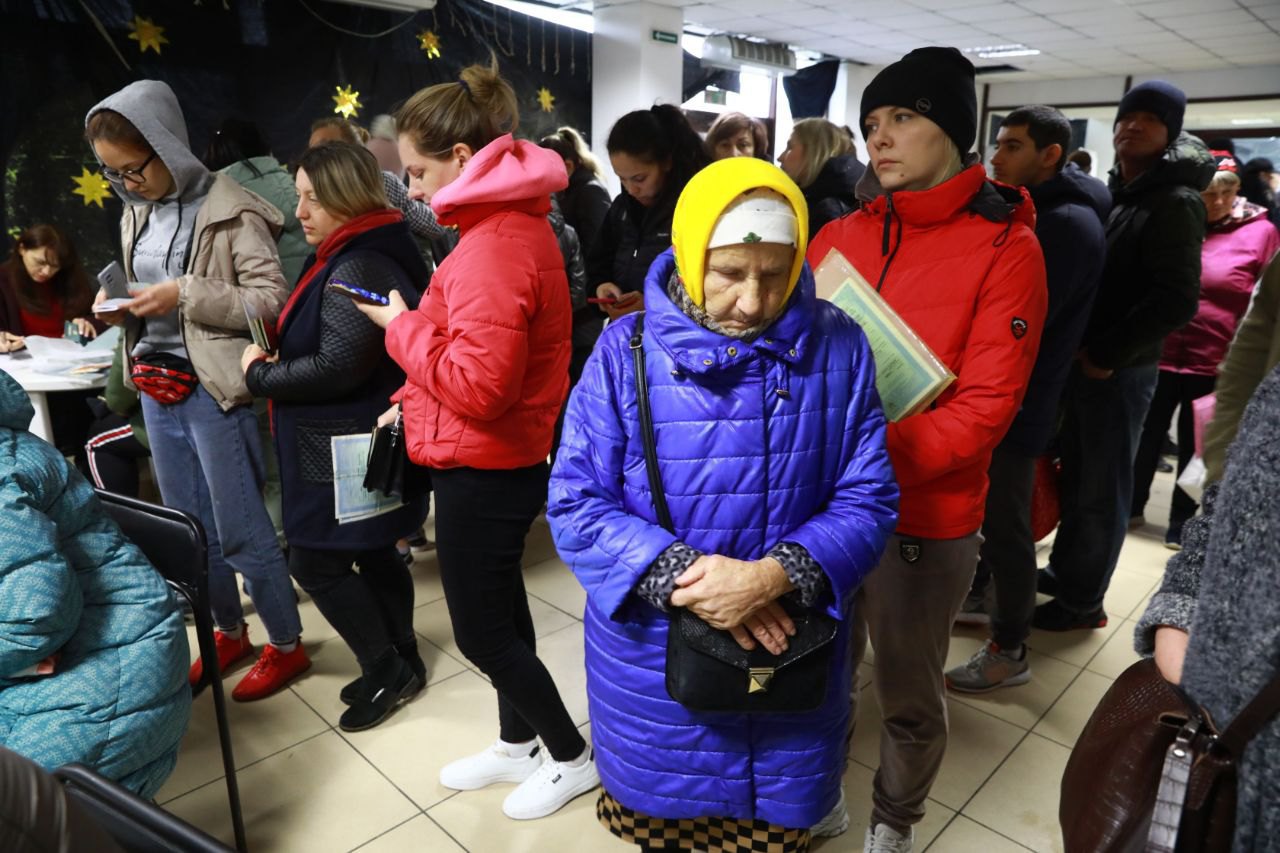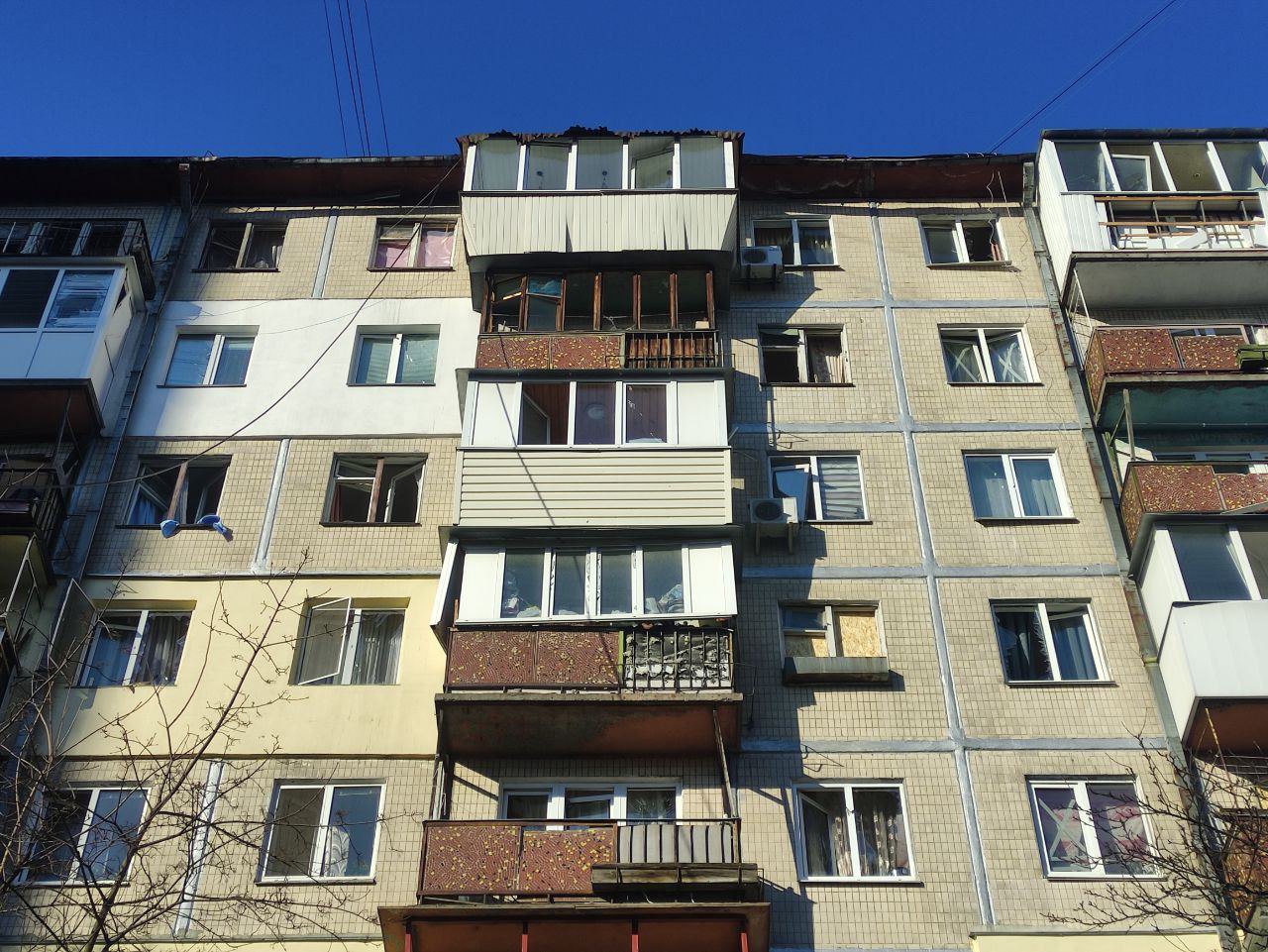
"People just roll up their sheets and blankets, leave the station and go somewhere to spend the day. And at night, they return to the subway station."
Serhiy's apartment is located in one of Kyiv's districts, which was shelled by the russian military in the middle of March. At the beginning of the war, he moved from a rented apartment to this one, as he had to help his mother get to the shelter when needed.
On 16 March 2022, a russian missile hit a nearby house. Some of the upper floors are destroyed, and the lower floors are covered with rubble. A fire broke out in some apartments. Serhiy's building suffered less: a detonation wave broke windows in his apartment and damaged some walls. At that time, he and his mother were at the subway station in a shelter.
- At about six in the morning, my neighbors called me and said that the missile had hit the building. When the subway gate was opened, I went to the building to see what happened, - Serhiy says. - The street was completely shattered, fragments smashed windows in the neighboring houses. In my apartment, everything was covered with glass as well. Missile fragments burned into the carpet in the living room. There were no windows; the balcony almost fell. Only the kitchen, the corridor, and the bathroom survived. In some neighboring apartments, the doors were blown off. In the rest of the building, the rescuers had to cut doors out so that people could take their belongings.
After the missile hit the apartment, Serhiy and his mother moved to the subway station. At that time, the station had turned into a home for people from the nearby districts and those where there are no underground stations that could be used as shelters. Several proactive people, including Serhiy, organized a small humanitarian center at the station to provide people with hot food and basic items. Later, Serhiy joined the volunteer center. Friends offered him to move to another place, but he did not want to live far from the volunteer center. His mother continued to help women who lived in the subway.
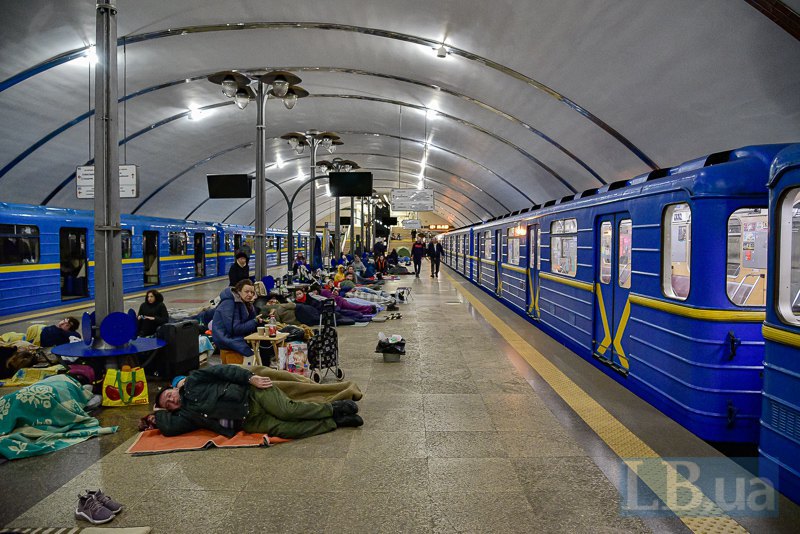
A few weeks, a subway employee asked people at the station to move out gradually as the subway began to resume its work. Serhiy's mother told him about it. He says they received no offers of temporary housing.
- After we were asked to leave the station, some people moved to their friends' places. Some stayed at the station, but not many. Families, including those from Irpin, lived at the station with their children. Two families from Bucha and Irpin still live there. They have nowhere to return. They are allowed into the shelter at the station before the curfew. Some people just roll up their sheets and blankets, leave the station and go somewhere to spend the day. And at night, they return to the subway.
In a comment to LB.ua, the deputy head of the Kyiv subway Natalka Makohon says that the subway is gradually starting to expand its work. Subway red branch has been reopened, trains are reducing the interval between stations, and subway working hours are increasing. Kyiv is coming back to life, so the stations continue to operate as shelters, but with some restrictions.
- During the night shift, when trains do not run, people can stay in the center of the platform. During the day shift, when trains run, and the high-voltage power supply is switched on, the rules must be followed, so we have defined places where people can stay at each station, - explains Natalka Makohon. - But the subway is a means of transportation, not housing. At the stations, there is no possibility, for example, to take a shower, get hot food, etc. We do not deal with housing. There are city social services that provide people with information about the opportunity to get IDP registration, receive compensation, and information about temporary housing. The time people will be able to stay at the stations depends not on the subway administration but the orders of the city's military administration.
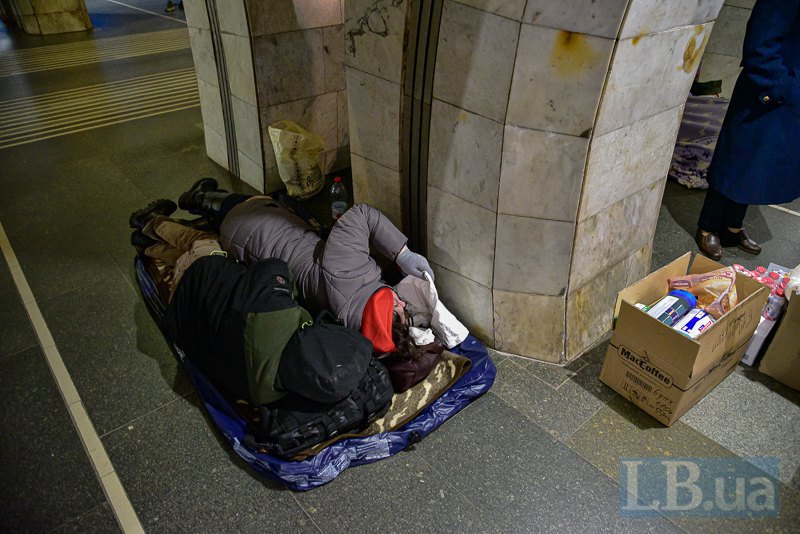
At the same time, as the Kyiv City State Administration told LB.ua, territorial service centers do not provide temporary accommodation services.
The task of the territorial centers is to help lonely elderly, people with disabilities, palliative patients, people whose income does not exceed two minimum wages, - says the deputy head of the Kyiv City State Administration on self-administration, Marina Khonda. - The territorial centers provide these people with basic items, home care, cooking, cleaning, etc. Currently, these centers also provide IDPs with food. There are also clothing and footwear banks in Kyiv districts where IDPs can apply through social security centers. In addition, specialists who work in shelters and metro stations provide people with first aid and useful information. This group was formed by the Office for Gender Equality and includes practical psychologists who help people get out of crisis and return to normal life.
People who now live in the subway stations and need housing can apply to district administrations, where they can be provided, if not with temporary housing, then places in social infrastructure facilities, like schools, kindergartens, etc., explains the representative Kyiv City State Administration. He says that no city in Ukraine has enough housing to cover all the needs. There is a department of urban planning and housing, and there is only a certain number of apartments that we can give.
Serhiy and his mother returned to their apartment; together with friends, they fixed the walls and windows with tape. They closed some holes with wooden boards and removed the missile fragments. Although many neighbors have left, people returned to apartments on the other side of the building, where the windows remain intact. In the neighboring house, which suffered more, there is light in the windows every night.
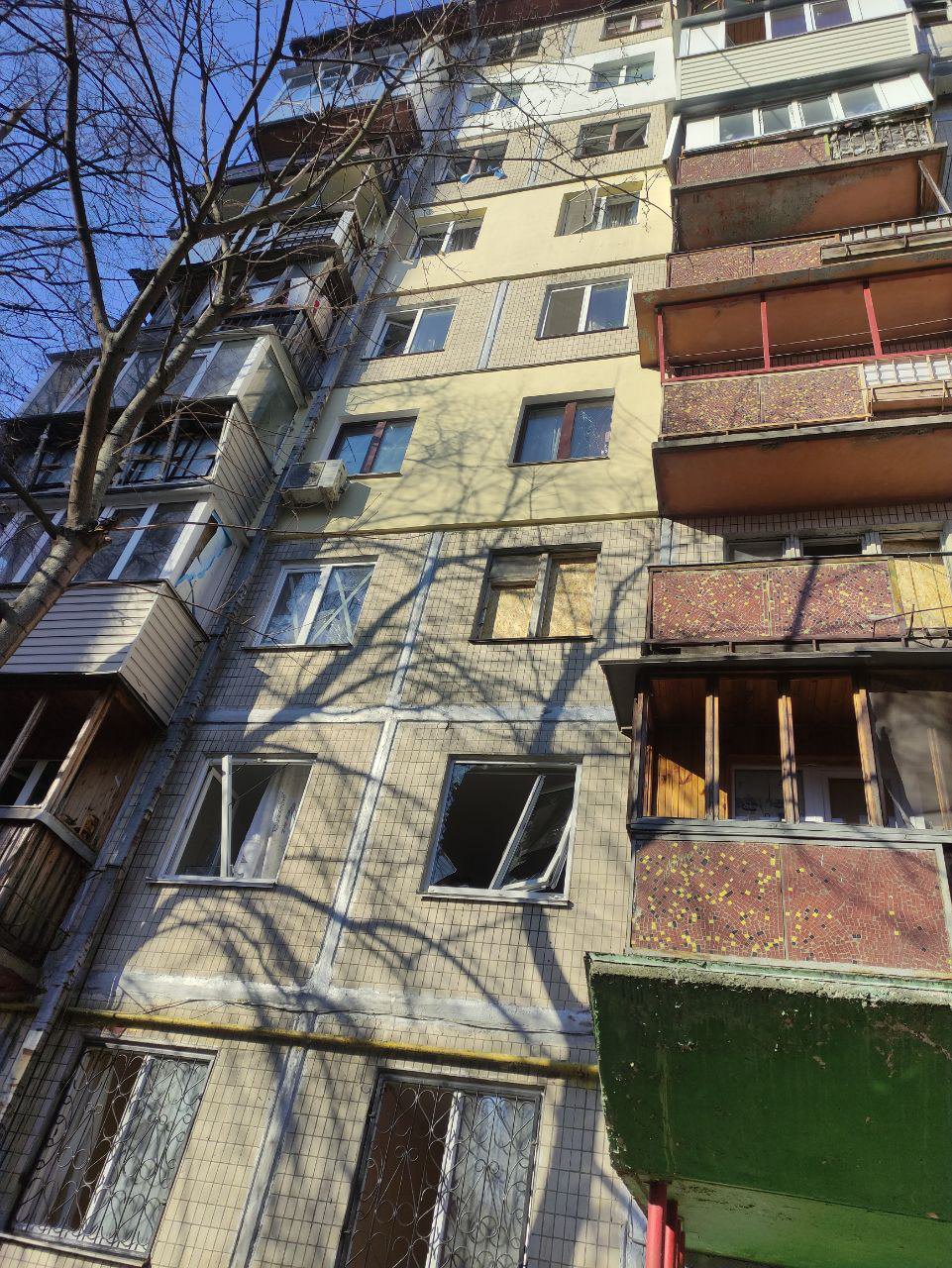
Survive and help
Serhiy says that government officials, including Kyiv City Mayor Vitaliy Klychko and member of the parliament, Petro Poroshenko, came to the building only once, the day after the russian missile hit the building. After that, no one contacted the neighbors.
Victims of war actions can use the "Dia" application to apply for compensation for the value of the damaged property. But one can receive this money only after a special commission is formed; this commission will assess the damage and create a procedure for compensation.
- We only applied for reimbursement through "Dia", - says Serhiy. - Employees of the Housing and Municipal Services Committee also came. The only thing they asked was when we installed the windows and whether they would be replaced due to the warranty terms. But the windows did not just fall out and did not break on their own. They took some photos, and that was it. No other committee came. Someone came to see the nearby building, but no one said what would happen next.
As of 8 April 2022, there were 208 damaged residential buildings, 46 schools, 29 kindergartens, and one orphanage in Kyiv. The KCSA (Kyiv City State Administration) claims that an initial inspection and inventory of damaged facilities in Kyiv is being conducted. However, when asked by LB.ua to name the number of acts of inspection of the condition of residential buildings damaged due to war actions in Kyiv, the KCSA replied that "the request will be considered after Ukraine's victory."
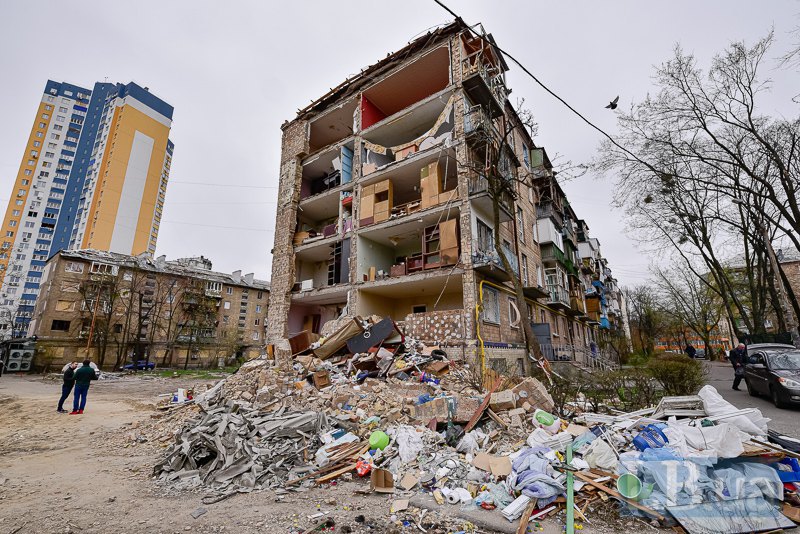
Before starting the restoration of buildings, we need a project on temporary fortifications so that water does not get into apartments, erosion does not start, and the building itself does not finally fall. The next step is examining the foundation and load-bearing walls of the building.
Kyiv City State Administration explained to LB.ua the following steps using the example of the building on Lobanovskyi Str. the most damaged floors there are those from the eleventh to the fourteenth. There are three options for how to act. First - to demolish the building from the 17th to the 10th floor and rebuild it from the tenth. The second option is to build new load-bearing structures and not demolish the floors. Or the third one: if the building cannot be saved, then we demolish it and build a new one. There must be expertise and a project for everything. Next, you need to look for resources because the project itself can be inexpensive, but the fortification can cost a lot. If to do everything correctly, no reconstruction and rebuilding can begin until the end of the war, says the representative of KCSA. What if they [russians] come and attack again?
Also, the KCSA says that it is still unclear where to get the money for reconstruction. Whether it will be reparations, government programs, or each city will buy housing from housing enterprises. The critical question is where to get the money because, according to the KCSA representative, the money was not filling the budget of the revenue part of the city during the war. There is money that is spent on transportation, salaries of municipal services employees, etc., but there are no financial resources for more.
The issue of compensation to people who were forced to rent housing because they lost their own remains open. The KSDA says there are no compensation mechanisms because there is no money, and this issue should be resolved at the state level, not at the city.
Now Serhiy spends almost all his time at the volunteer headquarters, collecting humanitarian aid for the victims from the Kyiv region. Together with other volunteers, they bring clothes and food to Borodianka, Bucha, and Hostomel.
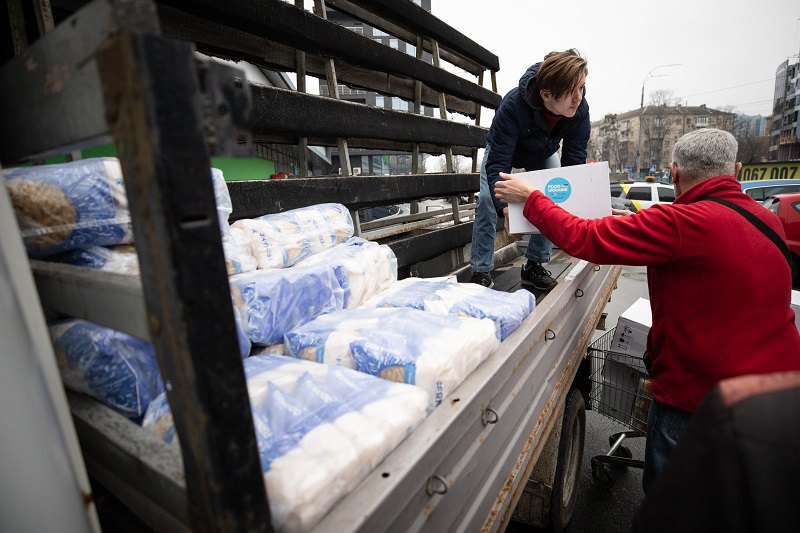
- I have many friends who, despite their problems, went to clean the rubble in Irpin and Bucha. And what are the options? Just sit and complain? I see no reason to do this. I have a plan - as long as there is a volunteer center and people need help, I will be doing it. That is what we do: survive and help. We go to the Kyiv region municipalities; we bring food and clothes. I was lucky, but the people there just lost everything.
At the state level
More than 14,000 residential buildings and about eight hundred of them are apartment buildings, were destroyed due to the russian invasion of Ukraine. More than 72,000 residential buildings, and more than 3,000 of them are apartment buildings, are damaged. Such data were provided by the Minister of Communities and Territories Development, Oleksiy Chernyshov, on 12 April 2022.
The Deputy Head of the Office of the President of Ukraine, Kyrylo Tymoshenko, said if we talk about the housing and objects of infrastructure the most affected cities in the liberated territories were Borodianka and Makariv of the Kyiv region and the municipalities of the Chernihiv region. According to the Minister of Communities and Territories Development, Oleksiy Chernyshov, the russian military destroyed two-thirds of multi-storey buildings in Borodianka. In addition, eight apartment buildings are to be dismantled as they cannot be restored.
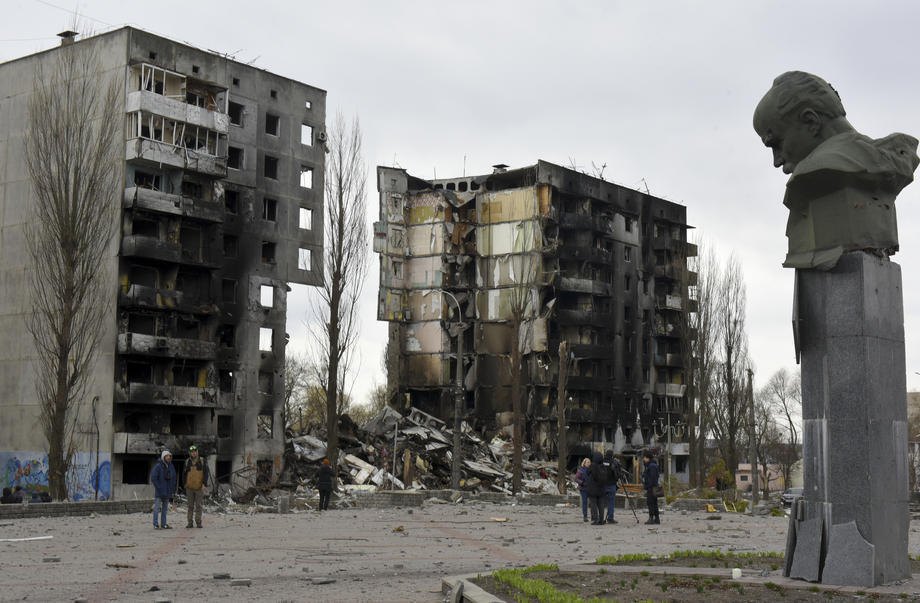
As a result of the war actions in the Chernihiv region, more than two thousand residential buildings, both private houses and apartment buildings, were damaged. People still live in damaged buildings.
- I was told that the "Dia" does not function yer; I was told to wait. They said, if you have your own construction materials, buy [if you can buy them, do so], then the employees of the Municipal Services Committee will come and perform the repairs. Come to their office, leave an application [for repairs]. And that's it - tell 82-year-old Maria Shilo, a resident of Chernihiv, to "Suspilne." Her apartment is on the fourth floor of the apartment building, which was hit by a missile. When it rains, the water enters the apartment through the leaky roof. So, when it rains, the old lady spends the night at the neighbors' place.
Chernihiv City Budget gave 30 million hryvnias to City Municipal Services Committee to do repairs. The money will be distributed proportionally between the residential buildings, but this will not be enough to do complete repairs. Therefore, the government sent another 250 million hryvnias from the reserve fund to the Chernihiv region. In addition, the Sumy region will also receive 250 million, the Zhytomyr region - 100 million, and another 400 million are to be given to the Kyiv region.
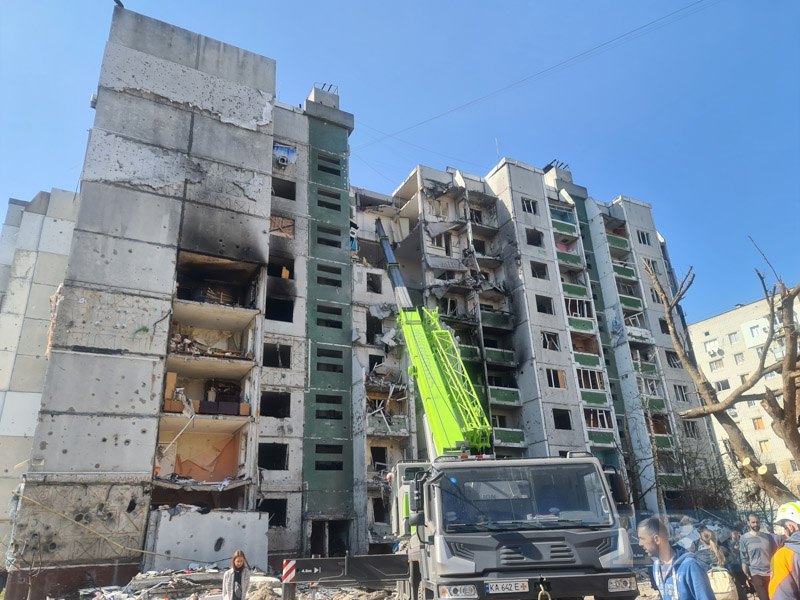
"The funds will be used to repair engineering networks and heat, gas, water, and electricity supply systems. Also, we will use them to clean the rubble, repair roofs, replace windows and doors, fix potholes on roads, and solve other priority issues," - said the Prime Minister of Ukraine, Denys Shmyhal.
On 1 April 2022, the Parliament of Ukraine approved Bill 7198 on compensation for housing damage due to its destruction by russian military.
If the house or apartment building can not be restored, it is planned to build a new one, but the new house or apartment will not be larger than 150 square meters. The first problem is that those who had apartments and those who had private houses find themselves in unequal conditions. After all, people whose houses were destroyed will be offered compensation that does not exceed the indirect construction costs. It is still unclear how it will be calculated. In addition, many people in the villages who have not conducted any estate transactions and may not have title deeds for their homes will not be able to receive compensation.
Secondly, it is not very clear whether homeowners in rural areas will be able to receive compensation for non-residential buildings, such as garages or barns. At the same time, one of the bill clauses allows for obtaining compensation for buildings "in which load-bearing and external enclosing structures were built and for which there is an official permission for construction available." Theoretically, it is possible; the same refers to commercial facilities.
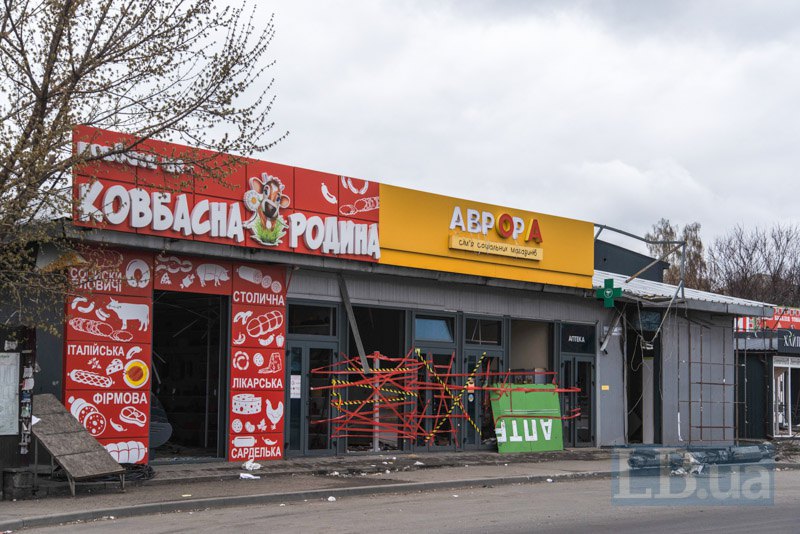
Third, it is not clear from the bill whether people who lived in dormitories and did not privatize their rooms will be able to receive compensation for lost housing. It is also not clear why foreigners with a permanent residence permit in Ukraine will not be able to receive compensation.
Fourth, in apartment buildings, the owners own the apartments and the entire building, including the land on which the building stands. If the building is destroyed, the co-owners are entitled to compensation for land alienation. However, there is no such compensation according to the law.
- After people get a new apartment, they will not be able to sell it for three years, which is against what people can do with their private property, - says researcher of the project "New Housing Policy," Pavlo Fedorov. - The general logic of this rule is that people stay in the country, and the state does not spend money on those who can basically take the money and go abroad. But people should be free to deal with their property as they please. If people do not want to live in this country, they should be able to take compensation and leave it. If they do not want to take a house or apartment, they must have the possibility of receiving the money, renting a house, leaving the country, or buying another place to live.
If the residential building can not be restored, the bill foresees financial compensation, the maximum amount of which will not exceed the cost of building a new residential building. It is not clear how much it will cost and how to evaluate the damages.
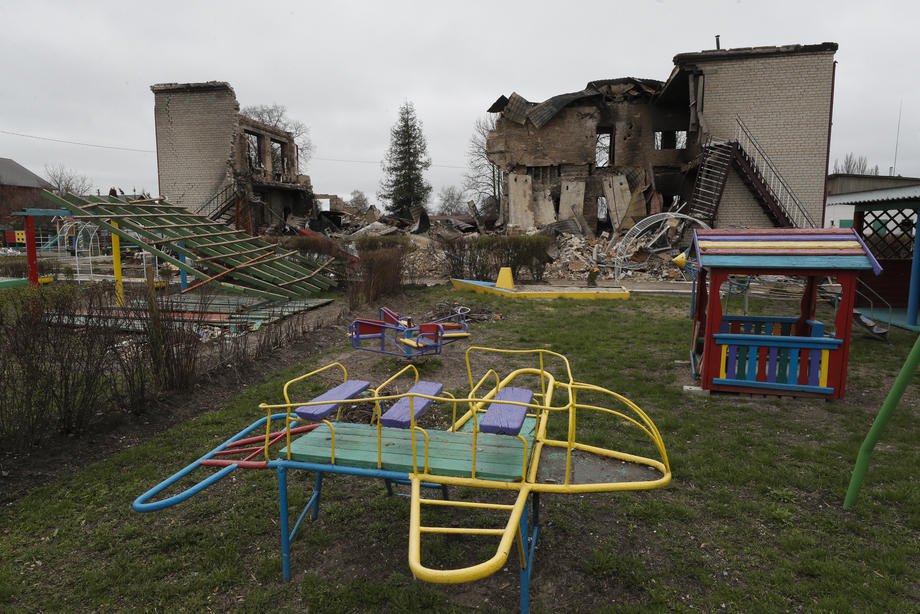
- There is no understanding of how to calculate the potential cost of repairs if there is no access to the site because it is, for example, in the mined territory, - says Pavlo Fedorov. - Besides, I don't think that let's suppose, in Borodianka, people will wait for weeks to have their house or apartment evaluated for the damage. They will start making repairs right away so that the rain does not fall on their heads.
Another problem is untying the hands of housing enterprises. Another new bill, 7282, approved on 21 April 2022, significantly simplifies the requirements for how urban planning should be done.
Yes, the construction industry means jobs and tax revenues. However, the state allocates budget funds for construction, and the amount of taxes that housing enterprises pay to the budget was never really shown.
Thus, the bill regulates the creation of temporary facilities such as "modular towns," built by the Ministry of Communities and Territories Development in Lviv and Borodianka. At the same time, the eight-year experience with the construction of such towns in the Dnipropetrovsk and Kharkiv regions shows that nothing is more permanent than temporary.
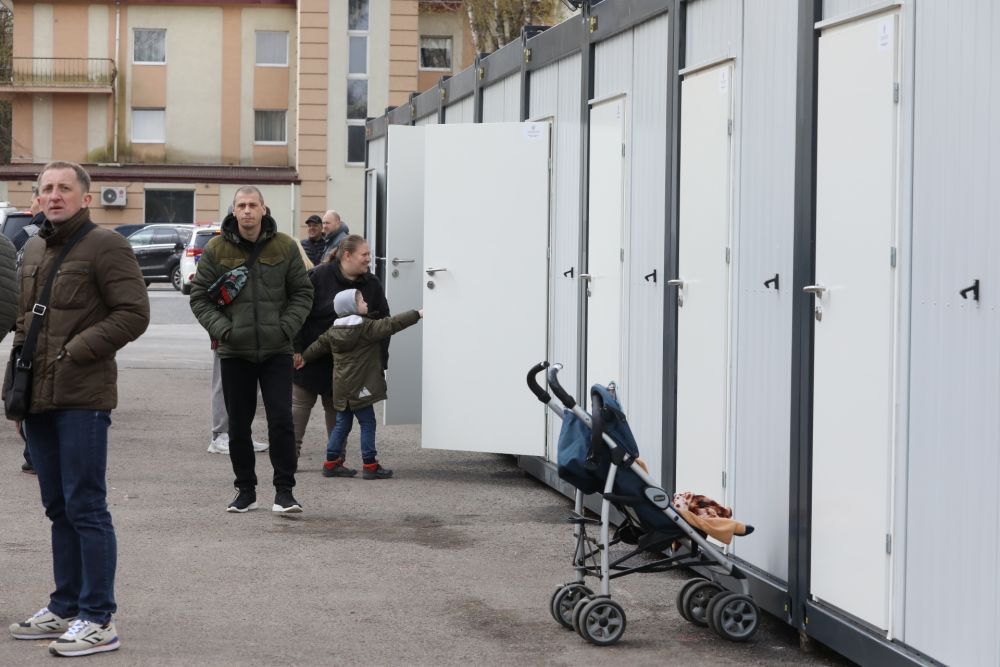
- Conventionally speaking, we are building temporary housing, so we do not need to build a school because it is temporary, - says Pavlo Fedorov. - In the future, we will face inadequate urban planning because while pursuing quick decisions, the housing enterprises want to abolish any urban planning regulations, SCRR (State Construction Rules and Regulations), etc. This keeps unbalancing the country's ability to conduct urban planning adequately.
What's now?
- I have nothing left - all my things burned down together with the apartment, but I still have not received a penny because I stayed in Kyiv. I appealed to the deputies and officials - everyone is throwing their hands up and advising to submit the application on the lost housing through "Dia." I did it, but I am unsure I will live long enough to see that compensation… So now I am simply left on the street with a pension of 2,700 hryvnias, " - says 69-year-old Polina Oleynichuk from Kyiv to "Khmarochos." Her apartment was damaged by a russian shell that hit the part of the apartment house.
Some people live in shelters in the subway stations and have nowhere to return. Some militaries stay in hospitals after recovery. If their home and military unit headquarters are on the temporarily occupied territory, they also have nowhere to return after being discharged. Some were evacuated to the hospitals with injuries caused by the russian occupiers' atrocities in the Kyiv region. After the treatment, these people have nowhere to go. They need places to live right now.
According to Kseniya Semenova, a deputy of the KCC (Kyiv City Council) from the political party "Sluha Narody" ["Servant to People"], those places in social facilities buildings that have been allocated for temporary accommodation in the capital have long been occupied.

Providing temporary housing is now conducted through the Department of Social Protection of district administrations, says Kseniya Semenova. - This issue, as well as the accommodation of IDPs, is very poorly worked out and suffers from a lack of communication. On 15 April 2022, I appealed to Vitaliy Klychko to instruct the KVSA to make public the information on how to obtain temporary accommodation in Kyiv. According to the regulations, I am waiting for an answer that can take up to 10 days.
At the same time, there are accommodation search services in Ukraine, for example, the "Prykhystok" ["Shelter"] project. On its site, people can offer their house or apartment for free for IDPs, and in return, the state will compensate the homeowners with 450 hryvnias for municipal services costs. However, it is difficult to assess the effectiveness of such a solution. First, it is unclear why this amount of compensation was determined. Secondly, there are only a few offers from the owners on the site.
Volunteer projects are also facing low interest from homeowners for renting accommodation for the IDPs. For example, "Dopomahai" ["Help"], the volunteer service for free accommodation, has helped more than 6,000 people find temporary housing. However, the number of offers from homeowners is already beginning to fall. It is happening because those who wanted to rent the accommodation for free or for little money have already done so.
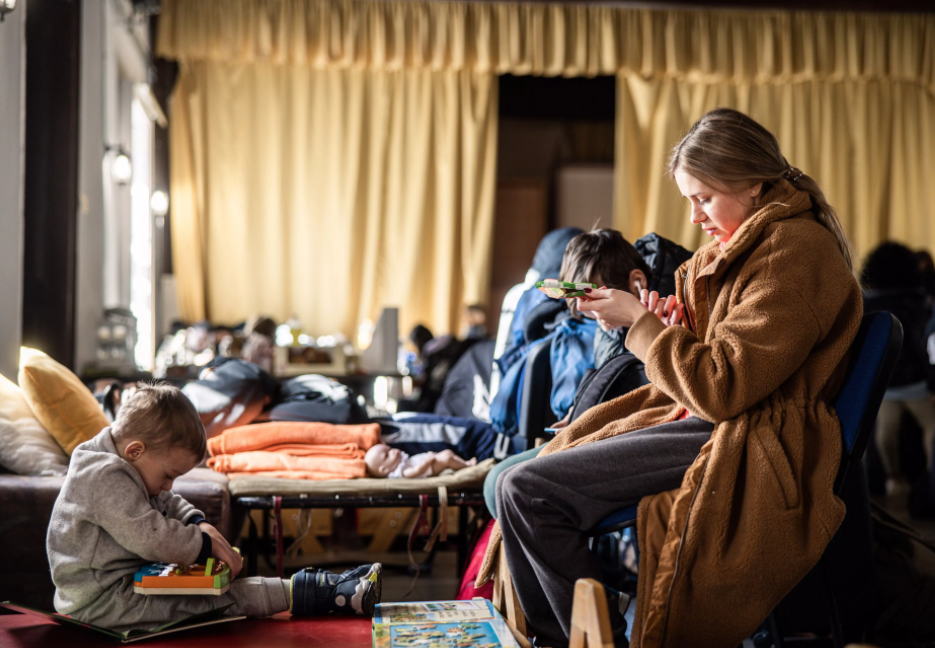
Are there any alternatives? There are various tools that the state can use to at least settle the issue of the rent. For example, to "freeze" the pre-war rent prices or eviction moratorium. This would allow people evacuating from the eastern regions to rent accommodation in relatively safe areas and not be afraid of evictions or skyrocketing rent prices.
Another mechanism that Ukraine has not used so far is quartering, says Pavlo Fedorov. - The legal regime of martial law says that the Civil-Military Administration (CMA) may use the premises of legal entities and individuals for the Armed Forces of Ukraine or the evacuated population. First, it would potentially reduce rental prices because if the homeowner knows that the CMA can settle people into an empty apartment, he is less inclined to take risks and wait for the tenant who would pay a skyrocketing price. Secondly, it would allow more efficient use of housing and avoid situations where there is no place to settle people, and the whole hotel "Premier Palace" remains empty.
